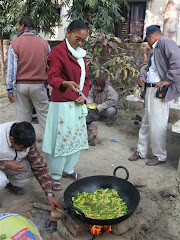Mangoes (aap) in shades of yellow, orange, green and red are abundant and cheap, while grapes (angur) are now hard to find, and tangerines (suntala) are becoming expensive (45p/kg). Jacaranda trees are in full flower, creating a bluish haze in the sky and a scattering of lilac petals on the ground. The unseasonal rain has made the parks and gardens green and helped with the fragile water and electricity supply for the city. It’s becoming hotter and more humid, with frequent heavy downpours.
A visit to the clinic and a hefty dose of tinidazole seems to have eliminated Giardia and Entamoeba from my system. A fact of life here I think. The doctor says he ‘debugs’ himself every six months.
The VSO conference in a smart hotel with beautiful gardens and pool in the northern suburbs, surrounded by wooded hills, was an excellent mix of presentations, work input and discussion, activity based sessions, practical information, opportunities to get to know other volunteers, and fun. We had input from Andrew Hall, the British Ambassador (British ‘interests’!), CK Lal, a leading newspaper columnist – the press here (2 English language dailies, and many Nepali ones) is remarkably free given the political situation, Krishna, the general secretary of the main teachers’ union, and the wonderfully charismatic Sanjay Acharya (a high caste Brahmin) who runs an NGO setting up schools for Dalit children in rural areas. The caste system is so deeply embedded here, in spite of being illegal for more than 40 years, and is an added dimension in disadvantage and poverty. Although the Dalits make up 25% of the population, there is only one Dalit MP and many children are still denied access to education. Wednesday night’s party was a team event with a nautical theme (the Nepali office staff needed careful explanations!), but was a great success in getting everyone ‘on board’. Our team won the dance competition wearing pirate hats fashioned from newspaper performing an elaborate routine led by Dunstan, an exuberant Ugandan while Mick played the Captain Pugwash theme on the melodeon.
We now feel more than ready to start work. Julie, who is working in the DEO in the far west, tells us that the contrast between the Terai and Kathmandu is greater than the contrast between Kathmandu and London. On Monday we hope to meet our ‘partners’ for a planning day. We are hopeful that they will arrive, in spite of the strike that has now closed all the schools and government offices in the country. The government has not been able to meet effectively for more than a week and no decisions are being made. I have some carefully prepared sentences, which I have been practising with Nepali colleagues here, but ‘conversation’ is a big challenge. Most of the VSOs outside Kathmandu are working in Nepali or a Nepali / English mix most of the time, so we look forward to improving. We have tickets for the 10:30 flight to Biratnagar on Tuesday, but have just heard that the flight is cancelled. There should be one at 12:30. We have a hotel booking, a cheque from VSO to buy things for our home, an emergency ticket to get back to Kathmandu and some Indian rupees should we need to leave the country to India. Although we are only 5km from the border in Biratnagar, that border is closed to foreigners, so we have to travel 4 hours by bus along the Mahendra Highway – closed frequently by the Maoists, so that may not be a viable option. We had an ‘eastern cluster’ meeting yesterday to discuss our contingency plans – us and Ugandan Joseph in Biratnagar, with Etienne, a young Dutch volunteer based in Dharan, 40km north of us. Staying put seems the best option.
We are making the most of our last weekend in the city, with a visit to a Nepali theatre, a concert at the British School, farewell dinner with new VSO friends and plans to eat lots of cheese. However, I have just learnt from Rima whose husband is from Biratnagar, that it has the biggest cheese factory in Nepal!
Deb and David will try to update this blog regularly while they are in Nepal. The views that are expressed in this weblog are the writers' own and do not necessarily reflect those of VSO.
ETC Morang
Biratnagar weather
About Me
- Deb and David
- Deb and David are leaving the UK for Papua New Guinea on February 4 2011 for their 3rd VSO placement. The views that are expressed in this weblog are the writers' own and do not necessarily reflect those of VSO.
Hungry caterpillar
making statues
.jpg)
Saraswati puja
.jpg)
Christmas dahlia

Christmas

recovery

cataract operations

diagnosis

English group

English teachers

Chhath
.jpg)
Manu
.jpg)
Rosie
.jpg)
fireworks

tikka powder

making resources

Down.....

Marpha apples

Kali Ghandaki

Buddhist monks

Kagbeni monastery

Tulsi

Lalmani

grinding maize

teachers' outing

towards Darjeeling

Ilam


kindergarten visit

David and the puppets
.jpg)
David's pocket chart

next door cows

chess in Bandipur
Bandipur
Kerala temple festival
Puja, age 10

headteacher tries to break the pot
catch the biscuit
Bishnu peels vegetables
group photo
cooking

Maliti

Christmas transport
Bardia Christmas
building the straw stack
rice threshing
Tihar
Janakpur temple
Dashain swing
Poon Hill
Annapurna South
baby Krishna
chariot

decorated oxen
Krishna Janmastami
Terai floods
the cow next door
new raincoat
More plants

At home

Dinesh

science teachers

Main Road

David on the terrace

primary teachers


Headteachers' picnic

sturdy bike

Nagarkot morning

Swayambhunath temple

view from window

'home'
arrival in Kathmandu
